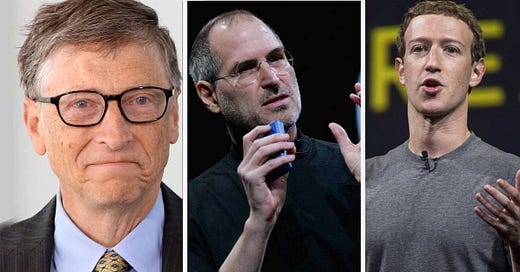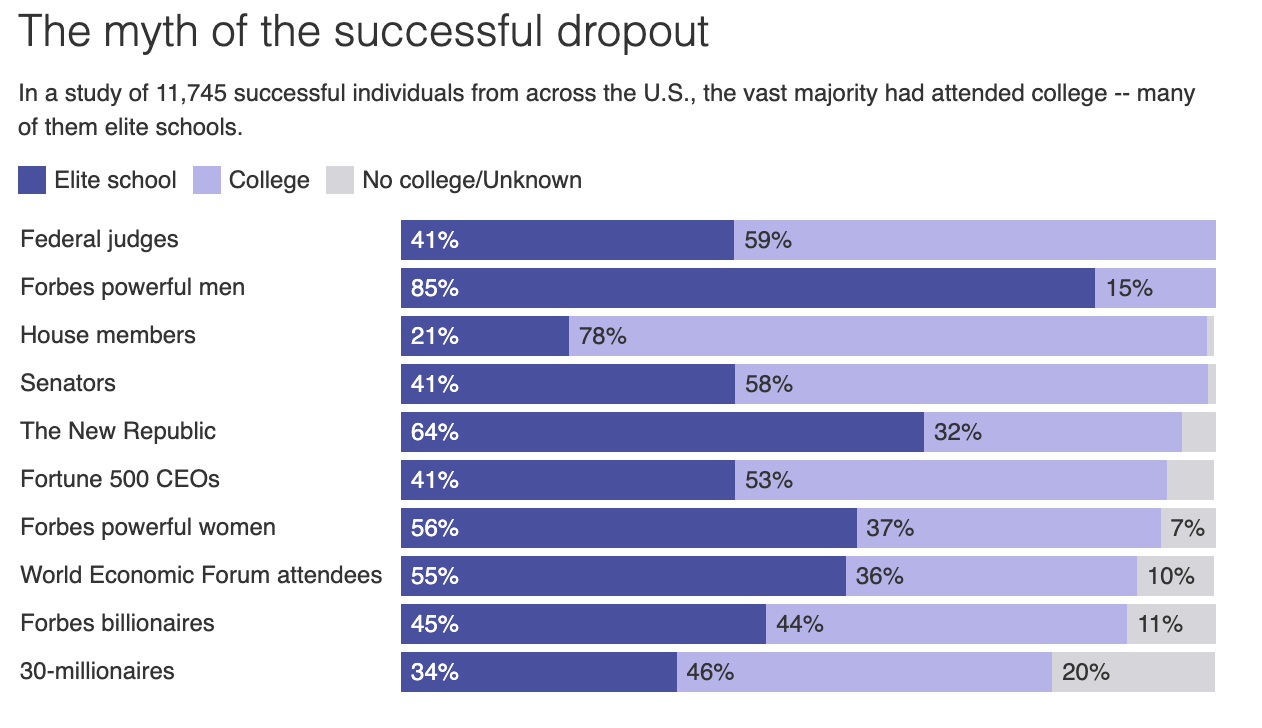Forget the College Dropout Myth
Here's what statistics show about successful startup founders
Think dropping out of college to found a startup sounds cool? You probably need to read this article and think twice.
Once we scan the headlines about tech titans, or think about how tech giants like Apple, Microsoft, and Facebook were founded, one of the first things that pops up in our mind is: the ultra-brilliant, young college dropout. They are typically twenty-something, often from an elite university, who ditch formal education to chase out-of-their-mind ideas that have turned to gold. These people have become the general myth in startup culture.
We picture Mark Zuckerberg in his Harvard dorm room, a young Bill Gates tinkering away, or Steve Jobs executing his visionary plans, all before receiving a university degree.
These iconic figures are incredibly inspirational, but focusing solely on them paints a dangerously skewed landscape of entrepreneurial success. They are the outliers, the exceptions that shine but don’t define the rule for success. Existing data, once we examine it closely, tells a profoundly different story.
The Numbers Don’t Lie: Age and Education Matter
Let’s start by talking about dropping out. Research strongly refutes the myth that college is optional for world-changers. A comprehensive study analysing over 11,700 US leaders — including CEOs, politicians, billionaires, and globally influential figures — found that as many as 94 per cent had attended college. Success stories like Sheryl Sandberg (graduated from Harvard), Jeff Bezos (graduated from Princeton), and Marissa Mayer (graduated from Stanford) are far more representative of the norm than the celebrated dropouts.
The idea that dropping out is a viable path to founding a successful company is statistically weak. Research highlighted in the Harvard Business Review found that only a tiny fraction, just 4 per cent, of college dropouts go on to become successful startup founders. Contrast this with the founders of “Unicorn” companies (those valued at US$1 billion or more) — as many as 62 per cent hold post-graduate degrees. Clearly, higher education, far from being an impediment or barrier, often correlates with achieving significant entrepreneurial successes and heights.
What about age? The cult of youth in tech suggests that innovation is solely the domain of the young. Again, the evidence points elsewhere. The same Harvard Business Review research discovered that the probability of extreme startup success actually increases with age, right up until one’s late fifties. The average age of founders behind America’s largest growth startups isn’t twenty-something; it’s forty-five. Even Unicorn founders typically start their ventures well into their thirties or beyond. Looking at the tech sector specifically — the very industry famed for its wunderkinder — the average founder age sits in the early forties. Other sectors, like oil, gas, and biotech, see averages closer to forty-seven.
When we zoom in on the absolute highest-performing startups (the top 0.1 per cent based on growth in their first five years), the average founder age remains consistently high, around 45. Success isn’t centred around youth; it appears to be built on accumulated experience, intelligence, maturity and social networks.
How to Improve Your Chance of Startup Success
Why does success favour older founders? The answer often lies in experience. Older entrepreneurs generally possess more industry knowledge, have navigated and overcome more challenges, learned from past mistakes, and built more extensive social networks. They are often found to take more calculated risks, backed by a deeper understanding of their field. This means their ability to control risk is better than their young counterparts.
One study found that founders with at least three years of prior work experience in the same industry as their startup were 85 per cent more likely to launch a highly successful venture. This makes sense. We wouldn’t expect a fresh graduate with minimal experience to excel as a senior vice president; similarly, launching and scaling a complex business benefits immensely from seasoned expertise. Older entrepreneurs’ paths, involving significant prior experience, are far more typical of successful founders than the dropout narrative suggests.
The stereotype of the technically brilliant founder often misses the mark. An analysis of New York City tech founders revealed that only 35 per cent had majored in STEM (Science, Technology, Engineering, Mathematics) fields. A significant majority, 65 per cent, studied other subjects, with political science being more common than electrical engineering or maths. While technical skills were once paramount, the barriers to entry for starting a tech company have lowered. Today, applying existing technologies to new markets or solving business problems often requires strong business judgement, market understanding, and leadership skills as much as, if not more than, deep technical expertise.
Conclusion
Despite this compelling evidence, the myth of the young, dropout founder persists, particularly in the venture capital (VC) world. Age bias remains a factor in Silicon Valley and beyond, with VCs sometimes favouring youthful potential over proven experience, even when data suggests the latter is a stronger predictor of success.
It’s crucial, therefore, to challenge these ingrained stereotypes. The media narrative needs broadening, and aspiring entrepreneurs should understand that the path to success is diverse. You do not need to have dropped out of an Ivy League school by 22 to build something impactful. Graduating, gaining industry experience, developing business skills, and even pursuing postgraduate education are all strongly correlated with entrepreneurial achievement.
The reality is that successful entrepreneurs come in all ages, with varied educational backgrounds and skillsets. They are often mid-career professionals leveraging their years of experience, not just fresh-faced coders or self-identified “futurists”. Data suggest time, experience, and education are valuable assets on the entrepreneurial trajectory.
It’s never too late to launch a startup, and you’re likely more qualified than the college dropout myths would have you believe.
Thanks for reading my brief analysis. If you would like to learn more about (mental) health, personal development and/or (online) education from me, please feel free to subscribe to my newsletter below. Also please feel free to browse my blog — Society & Growth — for more content at
https://jasonhungofficialblog.com/







Success is directly proportional to strong networks and i guess experience comes next. secondly i dont knw the xzct history v de dropouts u mentioned but when i see around me most v them came from well-off families who could afford to take risks without enoug bothering de consequences on their finance. i wanted to openup an acadey but i truly faced de prblm that networkig is not accible option for me as compared to men genuinely
pls dont mind ma spellings..